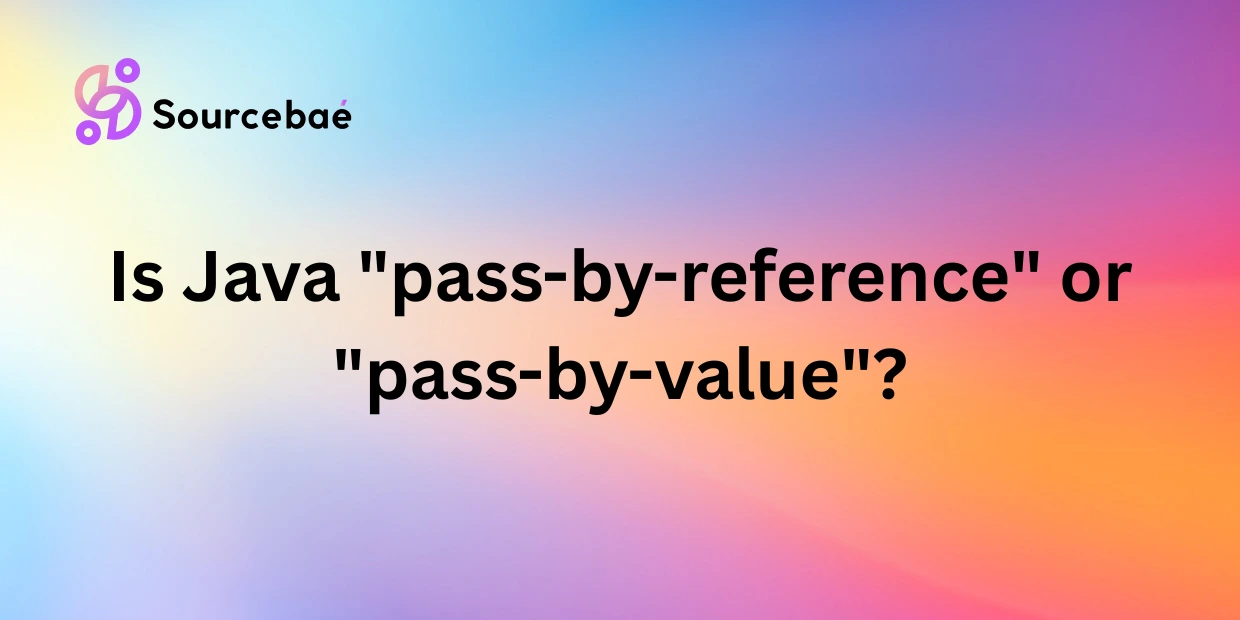Java Programming Language:
Java is a widely used programming language known for its portability, versatility, and efficiency. It is an object-oriented language that allows developers to create applications that can run on any platform without the need for recompilation. Java has a rich set of libraries and APIs that make it a popular choice for developing a wide range of software applications.
Passing Parameters in Java Methods:
When invoking a method in Java, parameters can be passed to the method to provide input values or data that the method will operate on. Java uses a specific mechanism for passing parameters called pass-by-value. Understanding how parameter passing works in Java is crucial for writing efficient and effective code.
Understanding Pass-by-Value in Java:
Definition of Pass-by-Value:
Pass-by-value is a parameter passing mechanism in which the actual value of the parameter is passed to the method. In this approach, a copy of the parameter’s value is created and passed to the method, rather than passing a reference to the original variable.
How Pass-by-Value Works in Java:
In Java, all primitive data types, such as int, float, char, etc., are passed by value. When a method is called and a primitive data type is passed as a parameter, a copy of the value is created and passed to the method. Any changes made to the parameter inside the method are not reflected back to the original variable outside the method.
Example Code Demonstrating Pass-by-Value in Java:
“`java
public class PassByValueExample {
public static void main(String[] args) {
int number = 10;
System.out.println(“Before method call: ” + number);
modifyNumber(number);
System.out.println(“After method call: ” + number);
}
public static void modifyNumber(int num) {
num = 20;
System.out.println(“Inside method: ” + num);
}
}
“`
In the above example, the value of the variable `number` remains unchanged after the method `modifyNumber` is called, demonstrating pass-by-value behavior in Java.
Understanding Pass-by-Reference in Java:
Definition of Pass-by-Reference:
Pass-by-reference is a parameter passing mechanism in which a reference to the original variable is passed to the method. Any changes made to the parameter inside the method are reflected back to the original variable outside the method.
How Pass-by-Reference Works in Java (or Lack Thereof):
Contrary to some other programming languages like C++, Java does not support true pass-by-reference. In Java, all non-primitive data types, such as objects, arrays, and collections, are passed by value, which means a copy of the reference to the object is passed to the method.
Example Code Demonstrating Pass-by-Reference in Java:
“`java
public class PassByReferenceExample {
public static void main(String[] args) {
StringBuilder sb = new StringBuilder(“Hello”);
System.out.println(“Before method call: ” + sb);
modifyStringBuilder(sb);
System.out.println(“After method call: ” + sb);
}
public static void modifyStringBuilder(StringBuilder str) {
str.append(” World!”);
System.out.println(“Inside method: ” + str);
}
}
“`
In the above example, the content of the `StringBuilder` object `sb` is modified after the method `modifyStringBuilder` is called. However, this is not true pass-by-reference but rather pass-by-value behavior in Java.
Differences Between Pass-by-Value and Pass-by-Reference:
Explanation of the Key Differences Between the Two Concepts:
The key difference between pass-by-value and pass-by-reference is whether a copy of the actual value is passed to the method or a reference to the original variable. Pass-by-value creates a copy of the value, while pass-by-reference passes a reference to the original variable.
Pros and Cons of Pass-by-Value and Pass-by-Reference:
Pass-by-value:
– Pros: Simple and predictable behavior, less risk of unintended side effects.
– Cons: May require more memory and processing resources for copying values.
Pass-by-reference:
– Pros: Allows direct manipulation of original variables, can be more memory-efficient.
– Cons: Increases the risk of unintended side effects, can be harder to reason about code behavior.
Exploring Java’s Behavior:
Explanation of Why Java Is Sometimes Considered Pass-by-Value:
Java’s pass-by-value behavior is often misunderstood because of how object references work in Java. While object references are passed by value, the content of the objects themselves are not. This can lead to confusion about whether Java uses true pass-by-reference.
Discussion on Common Misconceptions About Java’s Pass-by-Reference Behavior:
One common misconception is that when an object is passed as a parameter in Java, it is passed by reference. In reality, the reference to the object is passed by value, meaning changes to the object’s state can be reflected in the original object outside the method.
Frequently Asked Questions (FAQs):
Is Java Pass-by-Reference or Pass-by-Value?
Java uses pass-by-value for all parameters, whether they are primitive types or objects. Objects are passed by value, which means a copy of the reference to the object is passed, not the actual object itself.
Can Java Pass Primitive Types by Reference?
No, Java only supports pass-by-value, even for primitive types. When a primitive type is passed as a parameter, a copy of the value is created and passed to the method.
How Does Java Handle Objects When Passed as Parameters?
Java passes objects by value, which means a copy of the reference to the object is passed. This allows methods to modify the state of the object, but changes to the reference itself are not reflected outside the method.
Can We Simulate Pass-by-Reference Behavior in Java?
While Java does not support true pass-by-reference, it is possible to achieve similar behavior by using mutable objects or returning the modified object from a method.
Check out: Convert Java code to C#
Conclusion:
Summary of Key Points Discussed in the Blog Post:
In this blog post, we discussed the concepts of pass-by-value and pass-by-reference in Java, exploring how Java handles parameter passing for primitive types and objects. We also discussed common misconceptions about Java’s pass-by-reference behavior and provided examples to illustrate pass-by-value and pass-by-reference in action.
Final Thoughts on Understanding Java’s Parameter Passing Mechanism:
Understanding how parameter passing works in Java is essential for writing efficient and reliable code. By grasping the concepts of pass-by-value and pass-by-reference, developers can better manage data flow and ensure the integrity of their programs. Java’s unique approach to parameter passing provides a balance between flexibility and predictability, making it a versatile language for a wide range of application development tasks.





